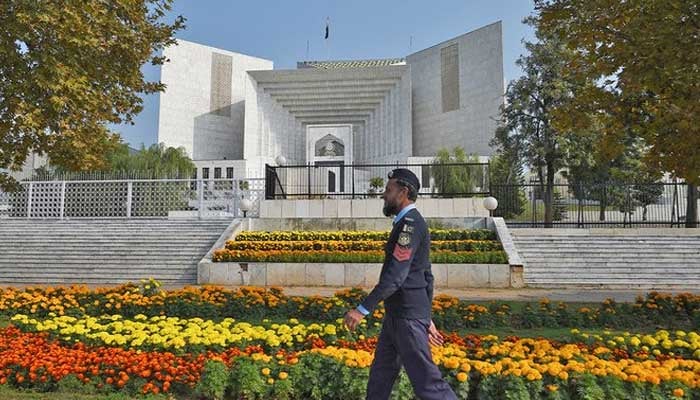Rights of people of Punjab, KP linked to polls: SC
CJP Bandial asks ECP counsel if any other institution forced ECP to change its stance in case
ISLAMABAD: The Supreme Court on Tuesday questioned the new stance taken by the Election Commission of Pakistan (ECP) in its review petition and asked whether any other institution had forced the electoral watchdog to do so. It also said that the rights of the people of Punjab and KP were connected to elections.
A three-member bench of the apex court, headed by Chief Justice Umer Ata Bandial and comprising Justice Ijazul Ahsen and Justice Munib Akhtar, heard the review petition filed by the Election Commission of Pakistan. The electoral watchdog had filed a review petition in the apex court against its order passed on April 4, setting May 14 as the date for holding elections in the province of Punjab. During the course of hearing, Chief Justice Umer Ata Bnadial observed that earlier the government was raising objections over the bench, stressing for constituting a full court besides claiming the judgment was a 4/3 split.
But now the government and the electoral watchdog were taking the election matter seriously. “The points you have raised in the review petition, why were they not stressed earlier,” the CJP asked Sajeel Shahryar Swati, counsel for ECP. “Whether any other institution has forced the electoral watchdog now to do so,” the CJP further asked the counsel. On Tuesday, the ECP counsel, while commencing his arguments, submitted before the court that in constitutional cases, the jurisdiction of the review petition was not limited, hence the apex court’s jurisdiction could be extended, rather than reducing it.
Elaborating his stance, the ECP counsel contended that the jurisdiction of the Supreme Court is limited to civil and criminal cases and dealing with review cases.
Justice Ijazul Ahsen however, observed that people approaching courts for fundamental rights are considered as civil in nature. The ECP counsel, however, contended that cases adjudicated upon under Article 184(3) of the Constitution are not civil in nature. Justice Munib Akhtar, another member of the bench, asked the learned counsel for the electoral watchdog if a case pertaining to an election comes to the apex court from the high court, would it not be a civil case?
During the hearing, Justice Munib Akhtar observed that the rights of millions of people in the country were linked to elections adding that the public interest was in holding polls within 90 days.
The judge further observed that the rights of the people of Punjab and Khyber Pakhtunkhwa (KP) are connected to elections since their respective assemblies were dissolved.
Meanwhile, Chief Justice Umer Ata Bandial observed that the Constitution has not provided the right of appeal in cases taken up under Article 184(3) jurisdiction. “Therefore, don’t convert the review into an appeal,” the CJP told the ECP counsel.
Sajeel Swati, however, contended that in review petitions, the court should also use the power of Article 187 of the Constitution for ensuring complete justice as well. He submitted that it would be cleared after the detailed judgment comes in the instant matter. Later, the court adjourned the hearing for today.
-
 Jerome Tang Calls Out Team After Embarrassing Home Defeat
Jerome Tang Calls Out Team After Embarrassing Home Defeat -
 Cynthia Erivo Addresses Bizarre Rumour About Her Relationship With Ariana Grande
Cynthia Erivo Addresses Bizarre Rumour About Her Relationship With Ariana Grande -
 Prince Harry, Meghan Markle Spotted Cosying Up At NBA All-Star Game
Prince Harry, Meghan Markle Spotted Cosying Up At NBA All-Star Game -
 Lady Gaga Explains How Fibromyalgia Lets Her 'connect With People Who Have It'
Lady Gaga Explains How Fibromyalgia Lets Her 'connect With People Who Have It' -
 Metro Detroit Weather Forecast: Is The Polar Vortex Coming Back?
Metro Detroit Weather Forecast: Is The Polar Vortex Coming Back? -
 Daniel Radcliffe Reveals Surprising Way Fatherhood Changed Him
Daniel Radcliffe Reveals Surprising Way Fatherhood Changed Him -
 ‘Disgraced’ Andrew At Risk Of Breaking Point As Epstein Scandal Continues
‘Disgraced’ Andrew At Risk Of Breaking Point As Epstein Scandal Continues -
 Alan Cumming Shares Plans With 2026 Bafta Film Awards
Alan Cumming Shares Plans With 2026 Bafta Film Awards -
 OpenClaw Founder Peter Steinberger Hired By OpenAI As AI Agent Race Heats Up
OpenClaw Founder Peter Steinberger Hired By OpenAI As AI Agent Race Heats Up -
 Kate Middleton's Reaction To Harry Stepping Back From Royal Duties Laid Bare
Kate Middleton's Reaction To Harry Stepping Back From Royal Duties Laid Bare -
 Rose Byrne Continues Winning Streak After Golden Globe Awards Victory
Rose Byrne Continues Winning Streak After Golden Globe Awards Victory -
 Ice Hockey Olympics Update: Canada Stays Unbeaten With Dominant Win Over France
Ice Hockey Olympics Update: Canada Stays Unbeaten With Dominant Win Over France -
 Brooklyn Beckham Makes This Promise To Nicola Peltz Amid Family Feud
Brooklyn Beckham Makes This Promise To Nicola Peltz Amid Family Feud -
 Chinese New Year Explained: All You Need To Know About The Year Of The Horse
Chinese New Year Explained: All You Need To Know About The Year Of The Horse -
 Canadian Passport Holders Can Now Travel To China Visa-free: Here's How
Canadian Passport Holders Can Now Travel To China Visa-free: Here's How -
 Maya Hawke Marries Christian Lee Hutson In New York Ceremony
Maya Hawke Marries Christian Lee Hutson In New York Ceremony




